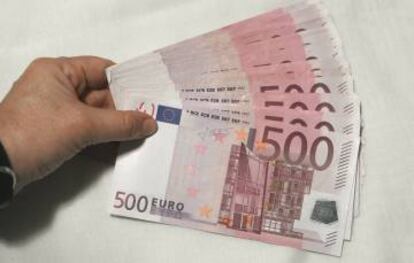Will Spain ever embrace cash-free consumption?
The technology is in place, but Spaniards are still not fully on board with electronic payment

Jesús Miguel Ramos owns a restaurant in the northern suburbs of Madrid called La Cabaña de Alcobendas, where around 55% of diners pay for their meals in cash. The rest are carried out electronically, either by card or voucher. Ramos is happy with that; he uses the cash to pay suppliers, while the electronic payments cover wages, rent and other expenses. In Spanish terms, Ramos is ahead of the game.

Around 70% of Spanish consumers still pay with cash, and only 30% electronically, according to the Director General of Mastercard, Ovidio Egido; in Scandinavia the reverse is true.
Cash is dirty, a hassle and expensive to manage, say the experts. According to Egido, the cost of printing, transporting and insuring it could amount to as much as 1.5% of global GDP. In contrast, electronic money is safe, comfortable, quick, and above all traceable. In other words, you know where it’s coming from, which makes it a no-no for tax fraud or the underground economy – long a thorn in the side of the Spanish Tax Agency.
New legislation has limited cash payments to €1,000
“The biggest social cost of cash is that it facilitates the existence of an hidden economy,” says Javier Alonso, recently named second-in-command at the Bank of Spain.
So why are the Spanish clinging to cash? Jesús Fernández-Villaverde, a professor at Pennsylvania University, doesn’t beat about the bush. “Tax fraud,” he says. “We have a bigger underground economy than other countries in a similar situation to our own.“ He also allows that it could be, in some measure, due to a distrust or ignorance of technology.
Emilio Vizuete, who teaches at Barcelona University, says it is mostly due to the lack of a financial culture in Spain. And Santiago Fernández de Lis, head of BBVA’s financial systems and regulation, also links Spain’s attachment to cash to its booming submerged economy.
But Tecnocom and AFI’s report on 2016 payment trends touches on other factors. One of the reasons people avoid paying by card or online, it says, has to do with the “associated commissions” as well as “the difficulty of controlling what has been spent.”
A rise in electronic payments
Even in Spain, however, electronic payments are catching up with cash payments. According to the Bank of Spain, for the first time ever, Spaniards paid more money by card – €27.8 billion – than they withdrew from cash machines – €26.6 billion – in the first quarter of 2016. “Two things are going on here,” says Antonio Macías, another BBVA executive. “On the one hand, there are more payment terminals in stores and, on the other, it’s easier to obtain a card.”

So will Spain ever become a cash-free society? Javier Alonso says absolutely not, due to the use of tangible money as a security deposit, something that is appreciated at times of crisis. However, he does see that new technology will make cash payments rarer, an opinion shared by Macías.
Carmen Alonso, Director General of Visa Spain, also believes that cash will carry increasingly less weight though she herself will not live to see its extinction. But Fernández de Liz, argues that low-denomination bills are a good thing, and should be allowed to survive.
Vizuete, however, is convinced that cash will disappear in the not too distant future, as is Antonio Argandoña, who teaches at IESE Business School. As far as Argandoña is concerned, such a scenario will depend on the development of a system “that is absolutely safe, fast, comfortable and available to everyone.”
All the experts agree that Spain could technically do without cash. “In the next five years we will see more innovation than in the last 50,” says Egido, while Macías points out that there is a high percentage of people with bank accounts in Spain, a fact reinforced by the Bank of Spain’s statement that there are 70 million bank cards in the country, while contactless or cellphone payments via Bizum, Apple Pay, Samsung Pay and other mobile services are on the rise. As far as safety is concerned, while Macías says risk cannot be totally eliminated, he notes that banks use the most secure systems available.
Cash is dirty, a hassle and expensive to manage, say the experts
To give this trend momentum, new legislation has been pushed through limiting cash payments to €1,000. Carmen Alonso also suggests implementing measures to enable electronic payment for public transportation or minor bureaucratic procedures.
Egido advocates selling the benefits of paying by card to both consumers and businesses alike, while Vizuete says it’s up to the banks to bring down the commissions charged to businesses for e-transactions.
As far as Ramos, the restaurateur, is concerned, “If they did that, no businessman would complicate his life with cash.”
English version by Heather Galloway.
Tu suscripción se está usando en otro dispositivo
¿Quieres añadir otro usuario a tu suscripción?
Si continúas leyendo en este dispositivo, no se podrá leer en el otro.
FlechaTu suscripción se está usando en otro dispositivo y solo puedes acceder a EL PAÍS desde un dispositivo a la vez.
Si quieres compartir tu cuenta, cambia tu suscripción a la modalidad Premium, así podrás añadir otro usuario. Cada uno accederá con su propia cuenta de email, lo que os permitirá personalizar vuestra experiencia en EL PAÍS.
¿Tienes una suscripción de empresa? Accede aquí para contratar más cuentas.
En el caso de no saber quién está usando tu cuenta, te recomendamos cambiar tu contraseña aquí.
Si decides continuar compartiendo tu cuenta, este mensaje se mostrará en tu dispositivo y en el de la otra persona que está usando tu cuenta de forma indefinida, afectando a tu experiencia de lectura. Puedes consultar aquí los términos y condiciones de la suscripción digital.








































